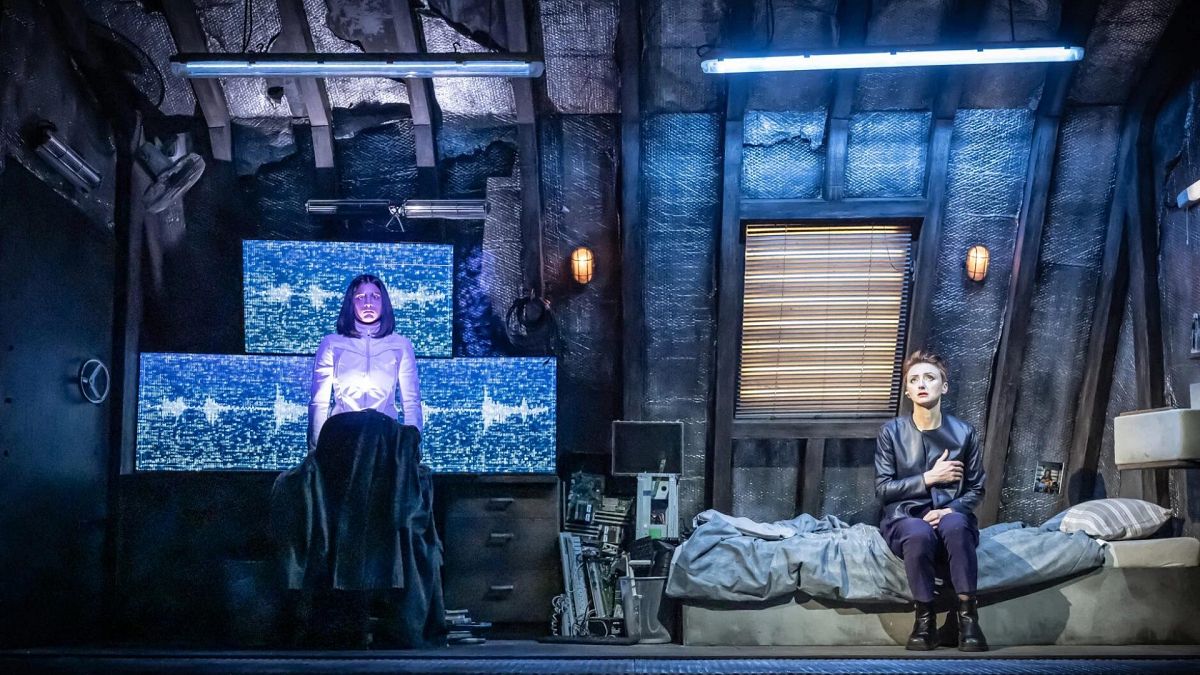Theatrical Adaptation of ‘The Minority Report’ Hits the UK Stage
A fresh adaptation of Philip K. Dick’s influential novella, The Minority Report, is set to tour UK theatres, with performances at London’s Lyric Hammersmith commencing on 20 April. This production marks a part of a burgeoning trend of science-fiction adaptations making their way into theatrical spaces, a genre that has traditionally faced challenges in translation from page and screen to stage.
Originally launched at the Nottingham Playhouse earlier this year, this adaptation draws from the 1956 novella that has seen various interpretations, most famously in the form of the 2002 Steven Spielberg film starring Tom Cruise. The theatrical rendition, which will also be showcased at the Birmingham Rep before moving to the Lyric, closely follows the narrative established in both the novella and the film. Under the direction of Max Webster, known for his acclaimed stage adaptation of Life of Pi, and scripted by David Haig, this version introduces a gender-swapped protagonist, the neuroscientist Dame Julia Anderton (portrayed by Jodie McNee), who finds herself accused of premeditated murder by the very predictive crime program she developed.
For those who have experienced the cinematic grandeur of Spielberg’s film or are familiar with Dick’s intricately layered sci-fi worlds, it may seem nearly impossible to encapsulate such visual feats within the more intimate confines of a theatre stage.
Theatre often thrives by engaging the audience’s imagination, allowing for a fluid navigation of spatio-temporal boundaries that might perplex a film viewer grappling with plot inconsistencies. This observation is not a critique of film but rather highlights how cinema’s vastly superior budgets and technical capabilities permit a realistic portrayal of concepts, while theatre’s limitations encourage a reliance on impressionism and abstraction.
However, recent theatrical undertakings are challenging these norms, as a wave of ambitious, high-budget productions redefines audience expectations in the sci-fi genre. The Minority Report is merely the latest installment in this evolving narrative.
Emergence of Sci-Fi Adaptations in Theatre

Late last year, the debut production at Factory International in Manchester’s newly inaugurated Aviva Studios—the largest UK investment in a cultural project since the Tate Modern’s opening in 2000—was Free Your Mind, an interactive dance adaptation of The Matrix directed by the legendary Danny Boyle. This hip-hop reimagining of the iconic 90s sci-fi film featured elaborate set pieces, creating a vivid tableau that interwove the original film’s themes with contemporary Manchester.
With the grand scale that Boyle famously showcased during the 2012 London Olympics opening ceremony, Free Your Mind stood out in its new €282 million (£242 million) venue, setting a high bar for future adaptations.
In London’s illustrious West End, other bold adaptations of sci-fi works that once seemed daunting for production designers have emerged. One notable example is the musical adaptation of Back to the Future, which made its West End debut in 2021 after several delays. While this musicalization of established intellectual property reflects a broader trend in the West End to lean toward safer, more familiar ideas (such as adaptations of Frozen, Mrs. Doubtfire, and Mean Girls), the production team managed to integrate an actual DeLorean that drives around on stage and even takes flight, leaving audiences in awe. However, despite its impressive car-centric spectacles, the musical itself received lukewarm reviews.
More recently, the play Stranger Things: The First Shadow, a prequel to the Netflix phenomenon, emerged from the creative minds of Kate Trefry, Jack Thorne, and the Duffer Brothers, with direction by Stephen Daldry. Initial anticipation for this production was low, as it was perceived as a potential cash grab amidst a sea of uninspired adaptations in top-tier UK theatre. Contrary to expectations, Stranger Things: The First Shadow has proven to be a technical marvel, showcasing some of the most impressive staging ever witnessed, brilliantly translating the sci-fi horror elements of the original series to a theatrical format.
The Rich Legacy of Sci-Fi in Theatre

This emerging trend of adapting popular sci-fi media for the stage appears poised to flourish as directors and producers continue to push the boundaries of special effects and stagecraft. However, the relationship between science fiction and theatre is not a recent phenomenon; it boasts a long and illustrious history.
- One of the earliest examples of a sci-fi play is Presumption; or, the Fate of Frankenstein, penned by Richard Brinsley Peake and first performed in 1823. This adaptation was based on Mary Shelley’s groundbreaking 1818 horror novel and introduced Victor Frankenstein’s assistant, Fritz, who is now frequently referred to as Igor.
- Another notable early work is Posle milijon godina (After a Million Years), written by Serbian playwright Dragutin Ilić in 1889, which is often credited as one of the first examples of sci-fi in theatrical form.
- The genre truly exploded in the 20th century with Karel Čapek’s play R.U.R., also known as Rossumovi Univerzální Roboti (Rossum’s Universal Robots), which is famously credited with popularizing the term “robot” in the English lexicon. In this play, a factory produces artificial workers from synthetic organic materials, labeling them robots, derived from the Slavic term for “work” or “labor.” Čapek attributed the invention of the term for these artificial beings to his brother, the painter and writer Josef Čapek.
